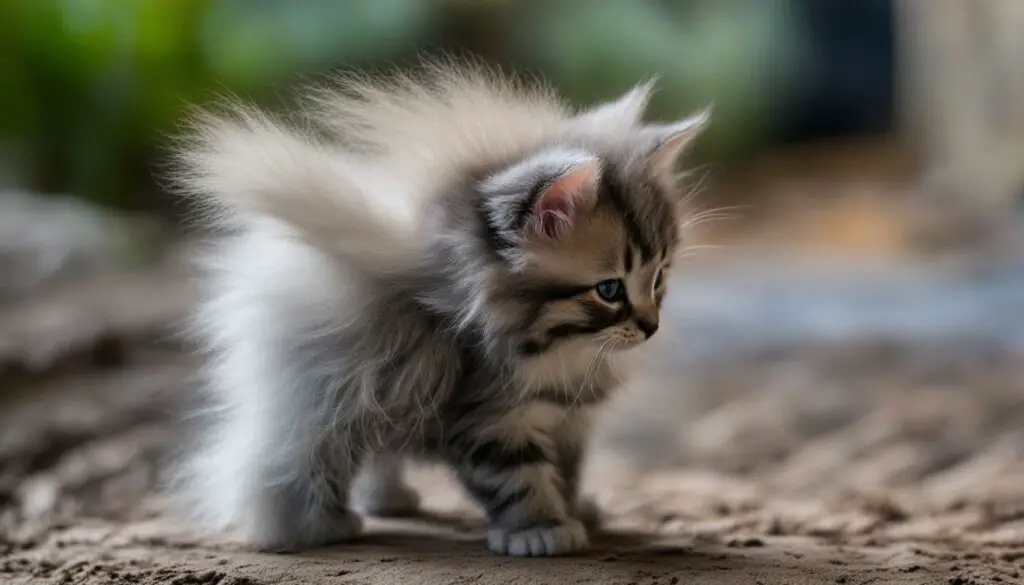Cats are generally clean creatures, so it can be concerning when you notice a bad smell coming from your kitten’s butt. There are several reasons why your kitten’s butt may stink, including the presence of mats in the fur, a urinary tract infection, arthritis, being overweight, issues with the anal glands, diarrhea, or chronic illness. Understanding the cause of the odor is important in order to address it effectively and keep your kitten comfortable and healthy.
Key Takeaways:
- Bad smells from your kitten’s butt can indicate underlying issues such as mats, urinary tract infections, or arthritis.
- Mats in your cat’s fur can trap odor-causing bacteria, so regular grooming is essential.
- A urinary tract infection can cause a foul odor, frequent urination, and accidents around the house.
- Arthritis can make it difficult for cats to groom, leading to urine or feces odor.
- Being overweight can lead to odor problems due to skin and fat folds trapping urine.
Mats Can Cause Rear End Odor in Cats
Cats are wonderful creatures, but sometimes even they need a little help in maintaining their hygiene. One common reason for a stinky rear end in cats is the presence of mats in their fur. This is especially common in long-haired cats like Persians. Mats can form around the rectum and genitals, trapping urine and feces, which can lead to a foul odor.
To prevent mats from forming, regular grooming is essential. Long-haired cats should be brushed daily to remove tangles and prevent mats from developing. Pay special attention to the backside, using a comb or brush with wide teeth to gently remove any knots or tangles. If your cat already has mats, it may be necessary to carefully trim or shave the affected area to eliminate the odor-causing problem.
| Mats Can Cause Rear End Odor in Cats |
|---|
| Regular grooming is essential for long-haired cats to prevent mat formation. |
| Use a comb or brush with wide teeth to gently remove knots or tangles. |
| Carefully trim or shave mats if necessary. |
It’s important to note that some cats may develop mats due to a wound in the rear end or other health issues. In these cases, it’s crucial to seek veterinary attention to address the underlying problem and provide appropriate treatment. Keep an eye out for any signs of discomfort or sensitivity in your cat when grooming, as this could indicate the presence of a wound or other issue.
By taking proactive steps to prevent and address mats in your cat’s fur, you can help eliminate the unpleasant odor and ensure that your furry friend is comfortable and healthy.
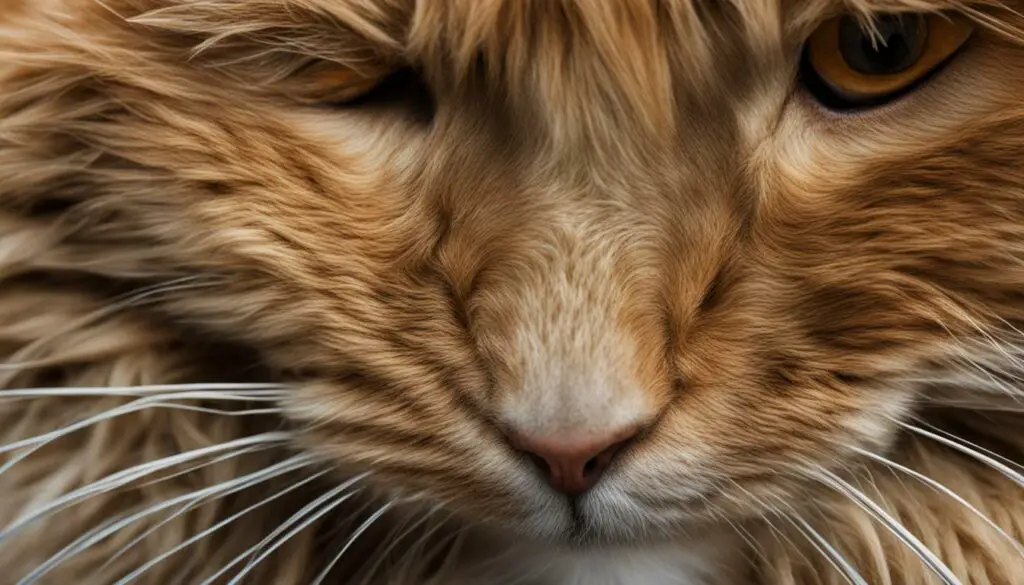
Urinary Tract Infection Can Cause a Smelly Cat
A urinary tract infection (UTI) can be a source of foul odor coming from your cat’s rear end. UTIs in cats are often caused by bacteria and can result in symptoms such as frequent urination, urinary accidents, and strong urine odor. If you notice these signs in your cat, it’s important to schedule a veterinary appointment to get a proper diagnosis and treatment plan.
During the veterinary examination, the veterinarian may perform a physical examination and collect a urine sample for analysis. This will help identify the presence of bacteria and determine the appropriate course of treatment. Depending on the severity of the infection, your cat may require antibiotics or other medications to clear the infection and alleviate the smelly odor.
To prevent UTIs in cats, it’s important to encourage regular hydration and provide clean, fresh water at all times. Additionally, maintaining a clean litter box and frequent litter changes can help minimize the risk of bacterial contamination. If you notice any changes in your cat’s bathroom habits or detect a strong odor coming from their rear end, don’t hesitate to seek veterinary care as early intervention can prevent complications and discomfort for your furry friend.
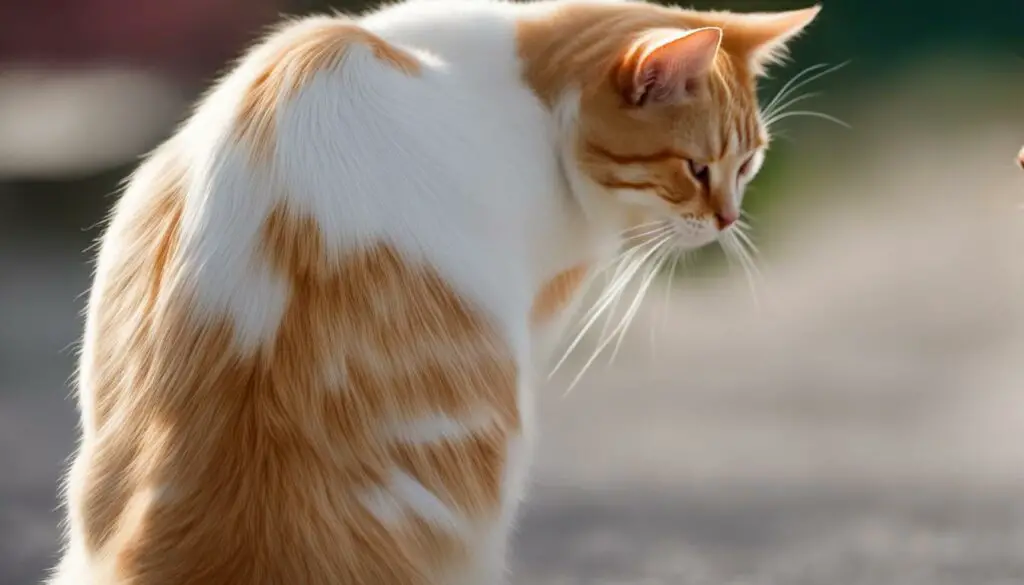
| Signs of Urinary Tract Infection in Cats | Treatment and Prevention Strategies |
|---|---|
|
|
Arthritis Can Cause a Stinky Kitty
Arthritis is a common condition in cats, particularly as they age. It can affect their mobility and make it difficult for them to groom certain areas of their body, including their rear end. This can result in urine or feces odor, which can be quite unpleasant.
To help alleviate this issue, it’s important to provide grooming assistance to your cat. This can include increasing the frequency of brushings to help remove any trapped debris or fecal matter. You can also use baby wipes to gently clean around their rear end and keep it fresh and odor-free. It’s important to consult with a veterinarian for proper guidance on how to assist your cat with grooming and to avoid giving them over-the-counter medications for arthritis.
Regular veterinary check-ups are crucial for cats with arthritis, as they can provide tailored treatment plans and recommend appropriate pain management strategies. Your veterinarian may also suggest nutritional supplements or joint health diets to help support your cat’s mobility and overall well-being. By working closely with your veterinarian, you can help ensure that your stinky kitty stays comfortable and happy.
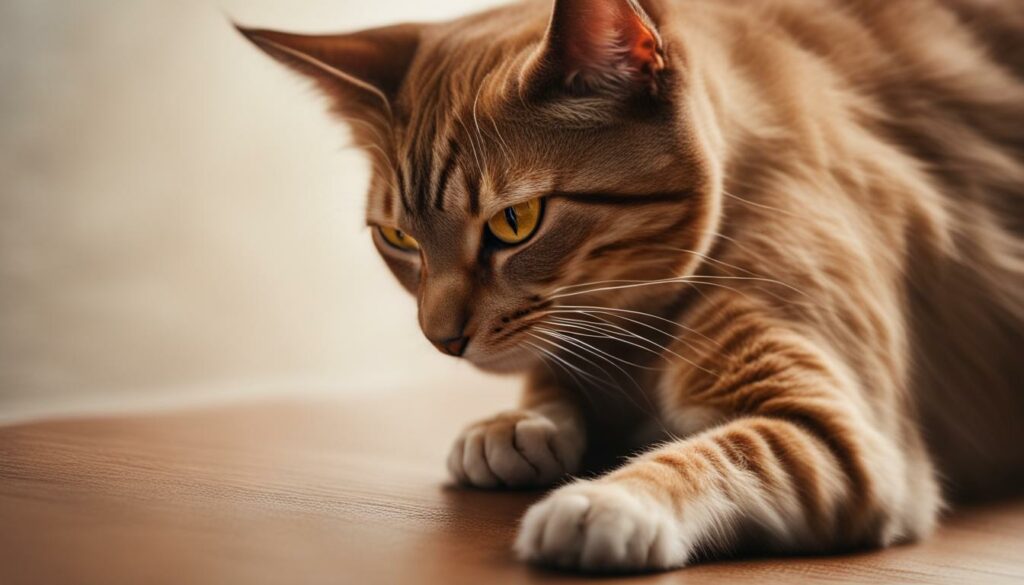
“Arthritis in cats can make it difficult for them to groom certain areas, resulting in urine or feces odor.” – Veterinarian
Being Overweight Can Cause a Stinky Cat Rear End
If your cat is overweight, it can lead to a stinky rear end. Excess skin and fat folds around the rectum and genitals can trap urine, causing a buildup of odor. Additionally, being overweight can make it difficult for cats to clean themselves properly, leading to further hygiene issues. To help alleviate the smell and improve your cat’s overall health, here are some weight loss tips:
- Consult with your veterinarian to determine the appropriate weight loss plan for your cat.
- Measure your cat’s food carefully and feed them smaller, controlled portions to promote weight loss.
- Encourage regular exercise through playtime and interactive toys. This will help your cat burn calories and shed excess weight.
- Avoid giving your cat excessive treats or table scraps, as these can contribute to weight gain.
While your cat is on a weight loss journey, it’s important to provide cleaning assistance for their rear end. Use gentle unscented baby wipes to clean the area regularly, being careful not to irritate their sensitive skin. If your cat has difficulty reaching their rear end due to their size, consider getting professional grooming assistance to ensure proper hygiene.
Table: Caloric Needs for Weight Loss in Cats*
| Weight Category | Calories per Day |
|---|---|
| 10 pounds | 180-200 calories |
| 15 pounds | 215-240 calories |
| 20 pounds | 250-280 calories |
| 25 pounds | 285-315 calories |
*These are general guidelines and may vary depending on your cat’s individual needs. It’s best to consult with your veterinarian for personalized calorie recommendations for your overweight cat.
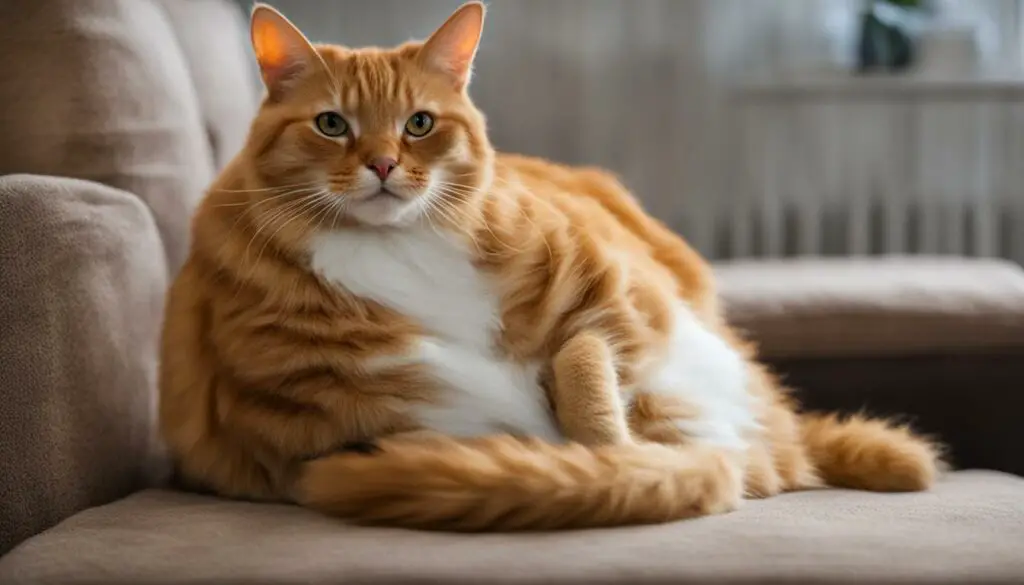
A Cat’s Anal Glands Can Be Stinky
Cats have scent glands near their rectum that can release a strong, foul-smelling substance. If these glands become infected, they can cause leakage or abscesses, resulting in a bad smell from your cat’s rear end. It’s important to be aware of the signs of anal gland issues, such as scooting, excessive licking, or a strong odor, and seek veterinary attention promptly.
To address anal gland issues, a veterinarian may perform a procedure called anal gland expression. This involves manually emptying the glands to relieve any buildup of fluid and reduce the odor. In some cases, antibiotics or other medications may be prescribed to treat an infection or abscess. It’s important to follow your veterinarian’s instructions and keep a close eye on your cat’s anal gland health.
Regular grooming and proper hygiene can also help prevent anal gland issues. Keep your cat’s rear end clean and free from feces and mats, as these can contribute to gland blockage. Additionally, providing a high-fiber diet and encouraging regular exercise can help promote healthy bowel movements and prevent gland problems.

Symptoms of Anal Gland Problems in Cats
- Scooting or dragging the rear end along the floor
- Excessive licking of the anal area
- A strong, foul odor coming from the rear end
- Pain or discomfort when sitting or defecating
- Swelling, redness, or discharge around the anal area
I noticed my cat scooting and licking excessively, and there was a strong smell coming from her rear end. I took her to the veterinarian, and they diagnosed her with anal gland issues. They performed anal gland expression and prescribed antibiotics. With proper care and regular grooming, her anal gland problems have been resolved.
If you suspect an issue with your cat’s anal glands or notice any of the symptoms mentioned, it’s crucial to seek veterinary attention. Your veterinarian can provide a proper diagnosis and recommend the appropriate treatment to ensure your cat’s comfort and well-being.
| Treatment Options for Anal Gland Problems | Pros | Cons |
|---|---|---|
| Anal gland expression | – Relieves discomfort and reduces odor – Can be done in a veterinary clinic or by a professional groomer |
– May need to be done regularly if your cat’s glands have chronic problems – Some cats may require sedation for the procedure |
| Antibiotics | – Treats infection or abscesses – Helps resolve underlying issues |
– Potential side effects – Requires compliance with medication administration |
| Dietary changes | – High-fiber diet can promote healthy bowel movements – Reduces the risk of gland blockage |
– May take time for dietary changes to show effects – Requires monitoring and adjustment as needed |
Diarrhea Can Cause a Stinky Cat
When cats experience diarrhea, it can result in a foul odor around their rear end. Diarrhea can be caused by various factors, such as dietary changes, infections, or underlying health issues. As a result, cats may struggle to contain the leakage, leading to skin and fur contamination. Additionally, when cats have diarrhea, they may be unable to effectively clean themselves, exacerbating the odor problem.
One way to determine if your cat has diarrhea is to inspect their litter box. If you notice loose or watery stools, it’s a sign that your cat is experiencing gastrointestinal distress. It’s important to address diarrhea promptly to prevent dehydration and further discomfort for your furry friend.
In cases of mild diarrhea, you can try feeding your cat a bland diet consisting of boiled chicken or fish and plain rice. This can help firm up their stools and alleviate the odor. However, if the diarrhea persists or is accompanied by other concerning symptoms, it’s crucial to seek veterinary attention for a proper diagnosis and treatment.
In case of diarrhea, it’s important to monitor your cat’s condition closely and provide them with the necessary care. Always consult with a veterinarian for guidance on treatment and management of diarrhea in cats.
Table: Causes of Diarrhea in Cats
| Cause | Symptoms |
|---|---|
| Changes in diet | Loose stools, increased frequency of bowel movements |
| Bacterial or viral infection | Diarrhea, vomiting, loss of appetite |
| Parasitic infection | Diarrhea with blood or mucus, weight loss |
| Inflammatory bowel disease | Chronic diarrhea, lethargy, poor coat condition |
| Food intolerance or allergies | Diarrhea, vomiting, skin irritation |
Proper veterinary diagnosis is essential to determine the underlying cause of your cat’s diarrhea. The table above provides a general overview of potential causes, but it’s important to consult with a veterinarian for a thorough examination and appropriate treatment options tailored to your cat’s specific condition.
Remember to always maintain good hygiene and clean your cat’s litter box regularly to minimize the spread of bacteria and odor. By addressing diarrhea and providing the necessary care, you can help your cat regain their comfort and overall well-being.
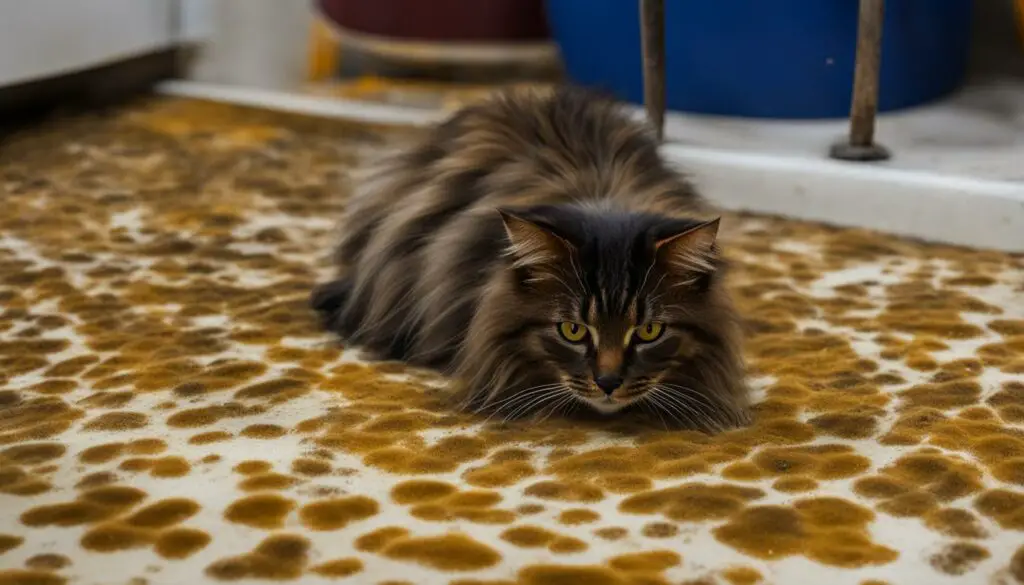
Chronic Illness Can Result in Stinky Kitties
Cats with chronic illnesses may experience a decrease in grooming, leading to greasy fur, mats, excess dandruff, and odor, especially from the rear end. Chronic illnesses can include conditions like kidney disease, liver disease, diabetes, or hyperthyroidism. When cats are unwell, they may lack the energy or motivation to groom themselves properly, resulting in a decline in their overall hair coat quality and cleanliness.
As a cat owner, it’s important to monitor your furry friend’s grooming habits. If you notice a change in their grooming behavior, such as decreased grooming or an increase in mats, it could indicate an underlying health issue. If you suspect your cat has a chronic illness, it’s crucial to consult with a veterinarian to discuss your concerns and create a treatment plan tailored to your cat’s specific needs.
Veterinary examinations, including blood tests and diagnostic imaging, can help identify the underlying cause of your cat’s chronic illness and guide treatment. Your veterinarian may recommend medications, dietary changes, or additional supportive care to help manage your cat’s condition and improve their overall well-being. Regular follow-up visits will ensure that your cat’s progress is monitored and adjustments can be made to their treatment plan as needed.
Grooming Tips for Cats with Chronic Illness
- Regularly brush your cat’s fur to remove any mats or tangles.
- Provide a comfortable and clean environment for your cat, including a cozy bed and litter box.
- Use specialized grooming tools, such as a mat remover or a slicker brush, to help maintain your cat’s coat.
- Consider using specially formulated cat wipes to clean your cat’s rear end if they are unable to do so themselves.
- Monitor your cat’s appetite, water intake, and litter box habits to track their overall health.
Remember, cats with chronic illnesses require extra care and attention. By working closely with your veterinarian and providing the necessary support, you can help your stinky kitty live a comfortable and happy life.
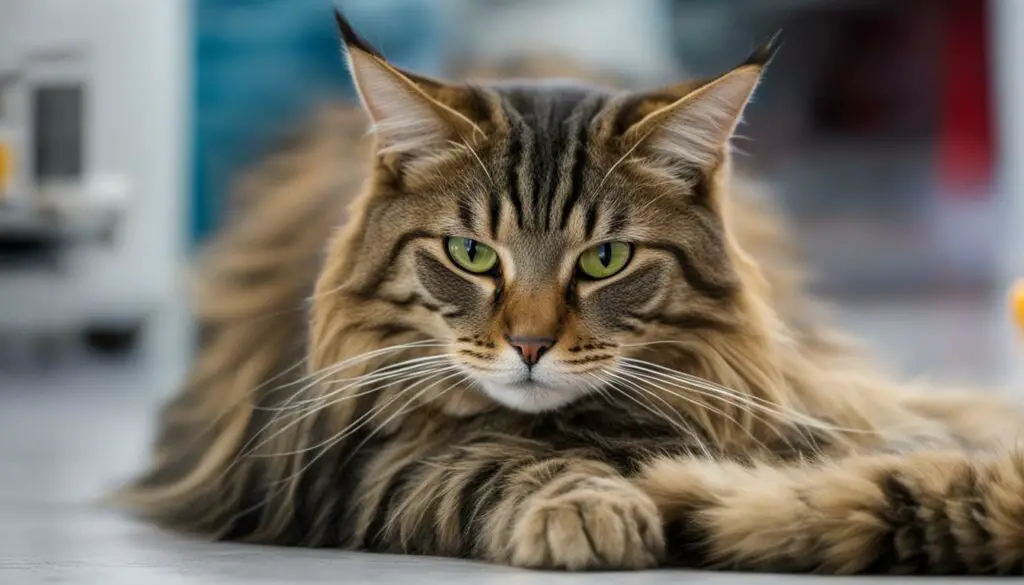
Seeking Veterinary Care
If you notice a persistent bad smell from your kitten’s rear end, it’s crucial to seek veterinary care for a proper examination and diagnosis. A veterinarian can determine the underlying cause of the odor and provide appropriate treatment options. They can also offer guidance on kitten care and hygiene to prevent future odor issues.
Importance of Veterinary Examination
A veterinary examination is essential to accurately diagnose the cause of your kitten’s smelly rear end. Through a thorough physical examination, the veterinarian can assess your kitten’s overall health and look for any signs of infection, inflammation, or other underlying conditions. They may also conduct additional tests, such as a fecal analysis or urine analysis, to gather more information for diagnosis.
Proper Diagnosis and Treatment Options
With a proper diagnosis, the veterinarian can recommend appropriate treatment options to address the specific cause of the odor. This may include medications, dietary changes, grooming techniques, or other interventions. It’s important to follow the veterinarian’s instructions closely to ensure the most effective treatment and resolution of the odor issue.
Healthcare Advice for Kittens
During your visit to the veterinarian, they can also provide valuable healthcare advice for your kitten. This may include recommendations for vaccinations, parasite prevention, nutrition, and general care. By following their advice, you can help maintain your kitten’s overall health and well-being, reducing the likelihood of future odor problems and promoting a happy and comfortable life for your furry friend.
Kitten Hygiene and Odor Prevention
Keeping your kitten clean and odor-free is an essential part of their overall health and well-being. Here are some tips to help you maintain proper hygiene and prevent unpleasant odors:
Grooming Regularly
Regular grooming is crucial for keeping your kitten’s fur clean and free from mats. Brushing their fur daily helps to remove dirt, debris, and loose hair, preventing it from accumulating around their rear end. Additionally, trimming their nails regularly can prevent feces from getting trapped in their paws, reducing the chances of odor-causing bacteria. Remember to use cat-friendly grooming products and techniques to ensure your kitten’s comfort.
Proper Litter Box Maintenance
Clean and well-maintained litter boxes are essential for preventing odor issues. Scoop the litter box daily to remove feces and clumps, and change the litter regularly to keep it fresh. Use unscented litter to avoid overwhelming your kitten’s sensitive sense of smell. Providing multiple litter boxes throughout your home can also help encourage proper usage and reduce accidents.
Diet and Exercise
Feeding your kitten a balanced diet and promoting regular exercise can contribute to their overall hygiene. A proper diet helps maintain healthy digestion, reducing the chances of diarrhea or excessive gas that can cause unpleasant odors. Exercise not only keeps your kitten physically active but also promotes gastrointestinal health and regular bowel movements.
Preventative Measures
Implementing preventative measures can go a long way in preventing odor issues. This includes regularly cleaning your kitten’s bedding and toys, as well as keeping their living area clean and odor-free. Additionally, ensuring their water bowl is fresh and clean can help prevent oral health issues that may lead to bad breath. Regular veterinarian check-ups and vaccinations are also essential for maintaining your kitten’s overall health and preventing potential underlying causes of odor.
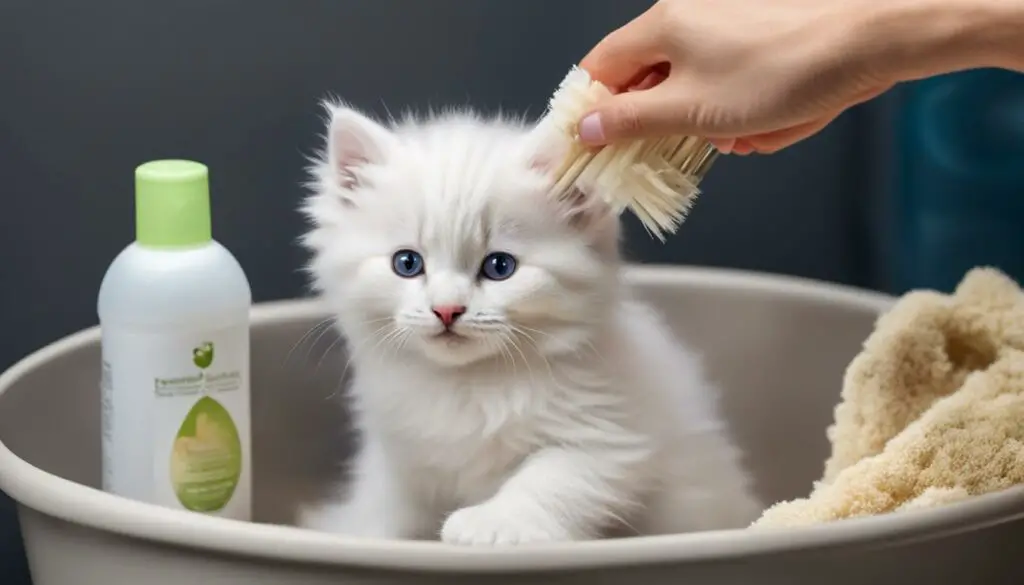
| Hygiene Tips | Summary |
|---|---|
| Grooming Regularly | Regular grooming helps keep your kitten’s fur clean and free from mats. |
| Proper Litter Box Maintenance | Regular cleaning and changing of the litter box prevent odor issues. |
| Diet and Exercise | A balanced diet and exercise contribute to overall hygiene. |
| Preventative Measures | Cleaning bedding, toys, and living areas, and regular veterinarian check-ups help prevent odor problems. |
Importance of Professional Consultation
When it comes to addressing the bad smell coming from your kitten’s rear end, seeking professional veterinary advice is of utmost importance. A proper diagnosis and treatment plan can only be provided by a trained veterinarian who can accurately identify the underlying cause of the odor and recommend appropriate solutions. DIY remedies or over-the-counter medications may not effectively address the root issue and could potentially be harmful to your kitten’s health.
During a veterinary consultation, the veterinarian will thoroughly examine your kitten and conduct any necessary tests to determine the cause of the odor. This may involve checking for infection, underlying health conditions, or assessing grooming habits. Based on their findings, the veterinarian will develop a tailored treatment plan to address the specific cause of the odor and improve your kitten’s well-being.
In some cases, the veterinarian may recommend specific products or medications to aid in the treatment process. It’s essential to follow their guidance and use only recommended products, as they have been tested and proven safe and effective for use in kittens. By taking advantage of professional consultation, you can ensure that your kitten receives the best care and that the root cause of the odor is effectively addressed.
Remember, the health and well-being of your kitten should always be a top priority. Trusting the expertise of a veterinarian and seeking their professional advice is crucial in ensuring that your kitten remains happy, healthy, and free from any unpleasant odors.
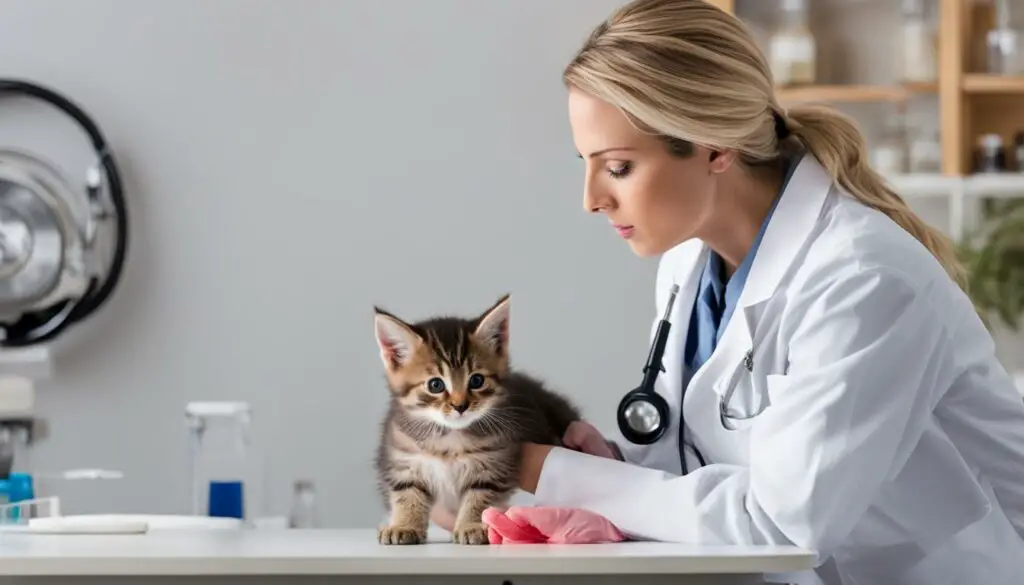
Are there any alternative solutions to professional consultation?
While professional veterinary advice is always recommended, there are a few general measures you can take to maintain your kitten’s hygiene and reduce odor issues. These include regular grooming, cleaning the litter box regularly, providing a balanced diet, and encouraging exercise. However, it’s important to note that these measures may not address the specific underlying cause of the odor and may only provide temporary relief. In order to effectively diagnose and treat the root cause, consulting with a veterinarian is essential.
Kitten Butt Odor Solutions for Overall Health and Well-being
After identifying the underlying causes of your kitten’s stinky butt, it’s important to take appropriate action to address the issue. By following the solutions outlined below, you can eliminate odor problems and ensure your kitten’s overall health and well-being.
Grooming and Hygiene
Regular grooming is key to maintaining a clean and odor-free rear end for your kitten. This is particularly important for long-haired breeds like Persians, as mats can trap odors and cause discomfort. Use a proper cat brush to remove any mats and tangles, paying special attention to the area around the rectum. If your kitten is resistant to grooming, be gentle and patient, and consider seeking professional grooming assistance if needed.
In addition to regular brushing, you may also use cat wipes or pet-specific cleaning solutions to keep the area clean and fresh. Ensure that any products used are specifically formulated for cats and avoid using harsh chemicals or human hygiene products.
Diet and Weight Management
Obesity can contribute to a stinky rear end in kittens, as excess fat and skin folds can trap urine and feces, leading to odor and potential infections. It’s important to provide a balanced diet that meets your kitten’s nutritional needs and to monitor their weight regularly.
Consult with your veterinarian to determine the appropriate portion sizes and feeding schedule for your kitten. Encourage exercise through interactive play sessions and provide toys that stimulate physical activity. By maintaining a healthy weight, you can reduce the likelihood of odor problems and promote your kitten’s overall well-being.
Veterinary Care and Regular Check-Ups
Regular veterinary care is essential in addressing the underlying causes of your kitten’s butt odor. Schedule routine check-ups to ensure your kitten’s health is monitored and any potential issues are identified and addressed promptly.
Your veterinarian can provide guidance on proper hygiene practices, recommend specialized products if necessary, and offer treatment options specific to your kitten’s needs. They may also suggest additional tests or procedures to rule out any underlying medical conditions that may be contributing to the odor.
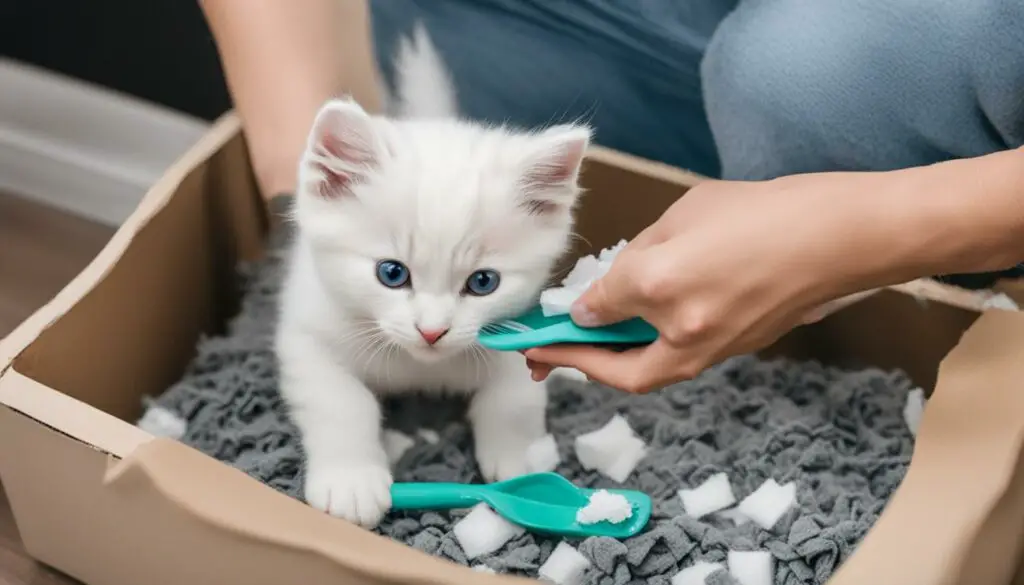
Summary of Key Points
- Regular grooming and hygiene practices are crucial for addressing kitten butt odor.
- A balanced diet and weight management can help prevent odor issues.
- Seeking regular veterinary care ensures your kitten’s overall health and well-being.
- Monitor your kitten’s weight and engage in regular play to promote a healthy lifestyle.
By implementing these solutions, you can effectively tackle kitten butt odor and promote your furry friend’s overall health and well-being. Remember to consult with your veterinarian for personalized advice and guidance tailored to your kitten’s specific needs.
Recommended Products and Resources
When it comes to taking care of your kitten’s hygiene and addressing odor issues, there are a variety of products and resources available to assist you. One essential item is high-quality kitten care products, including grooming tools designed specifically for cats. These tools can help you keep your kitten’s coat clean and free from mats, preventing any unpleasant smells from the rear end.
In addition to grooming tools, cat hygiene products like odor-neutralizing sprays and specialty cat wipes can be valuable in maintaining cleanliness. These products are formulated to effectively eliminate odors and provide a fresh and pleasant scent. They can be used during regular grooming sessions or whenever your kitten requires a quick freshening up.
When seeking information and advice on kitten care, it can be beneficial to explore online resources such as kitten care guides. These guides offer valuable insights, tips, and step-by-step instructions on how to care for your kitten’s hygiene needs. They can provide guidance on grooming techniques, litter box maintenance, and other important aspects of keeping your kitten clean and odor-free.
Finally, don’t underestimate the importance of consulting reputable veterinary resources. Veterinarians possess extensive knowledge and experience in dealing with various kitten health issues, including those related to hygiene and odor. They can recommend specific products that are safe and effective for your kitten, and provide comprehensive guidance on maintaining proper hygiene and preventing odor problems.
FAQ
Why does my kitten’s butt stink?
There are several reasons why your kitten’s butt may smell, including mats in the fur, urinary tract infections, arthritis, being overweight, issues with the anal glands, diarrhea, or chronic illness.
How can mats cause rear end odor in cats?
Mats in the fur around your cat’s rectum and genitals can catch urine and lead to a bad smell. Long-haired cats, such as Persians, are especially prone to mat formation. Regular grooming and attention to the backside can help prevent odor caused by mats.
Can a urinary tract infection cause a smelly cat?
Yes, a urinary tract infection can cause a bad smell from your cat’s rear end. Bacteria in the urine can lead to a foul odor and increased frequency of urination. If you suspect a urinary tract infection, it’s important to schedule a veterinary appointment as soon as possible.
How does arthritis contribute to a stinky kitty?
Arthritis can make it difficult for cats to groom certain areas of their body, including their rear end. This can result in urine or feces odor. Older cats may require additional help with grooming, such as increased brushings and the use of baby wipes around their rear end.
Can being overweight cause a stinky cat rear end?
Yes, obesity in cats can lead to a smelly rear end. Folds of skin and fat around the rectum and genitals can catch urine, leading to odor and potential infections. Regular cleaning with baby wipes and promoting weight loss through increased play and a controlled diet can help alleviate the odor.
What role do a cat’s anal glands play in causing odor?
Cats have scent glands near their rectum that can release a strong, foul-smelling substance. If these glands become infected, they can cause leakage or abscesses, resulting in a bad smell from your cat’s rear end. Seek veterinary attention promptly if you suspect an issue with your cat’s anal glands.
Can diarrhea cause a stinky cat?
Cats with diarrhea can sometimes struggle to keep it contained, leading to a bad odor around their rear end. Proper diagnosis and treatment can help resolve the odor and address any underlying health issues.
How does chronic illness contribute to a smelly kitty?
Cats with chronic illnesses may experience a decrease in grooming, resulting in a decline in their overall hair coat. This can lead to greasy fur, mats, excess dandruff, and odor, especially from the rear end. Consult with a veterinarian to address any underlying health issues.
When should I seek veterinary care for my kitten’s odor?
If you notice a persistent bad smell from your kitten’s rear end, it’s crucial to seek veterinary care for a proper examination and diagnosis. A veterinarian can determine the underlying cause of the odor and provide appropriate treatment options.
How can I prevent odor and promote hygiene in my kitten?
Maintaining proper hygiene and implementing preventative measures can help prevent odor issues in kittens. Regular grooming, maintaining a clean litter box, providing a balanced diet, and encouraging exercise can contribute to overall hygiene and reduce the likelihood of odor problems.
Is professional veterinary advice important?
Yes, it’s important to seek professional veterinary advice for accurate diagnosis and appropriate treatment. DIY remedies or over-the-counter medications may not address the underlying cause of the odor and could potentially be harmful to your kitten.
Are there recommended products and resources for kitten hygiene?
Yes, there are various products available, such as grooming tools, odor-neutralizing sprays, and specialty cat wipes. Additionally, online kitten care guides and reputable veterinary resources can provide helpful tips and information for keeping your kitten clean and odor-free.

